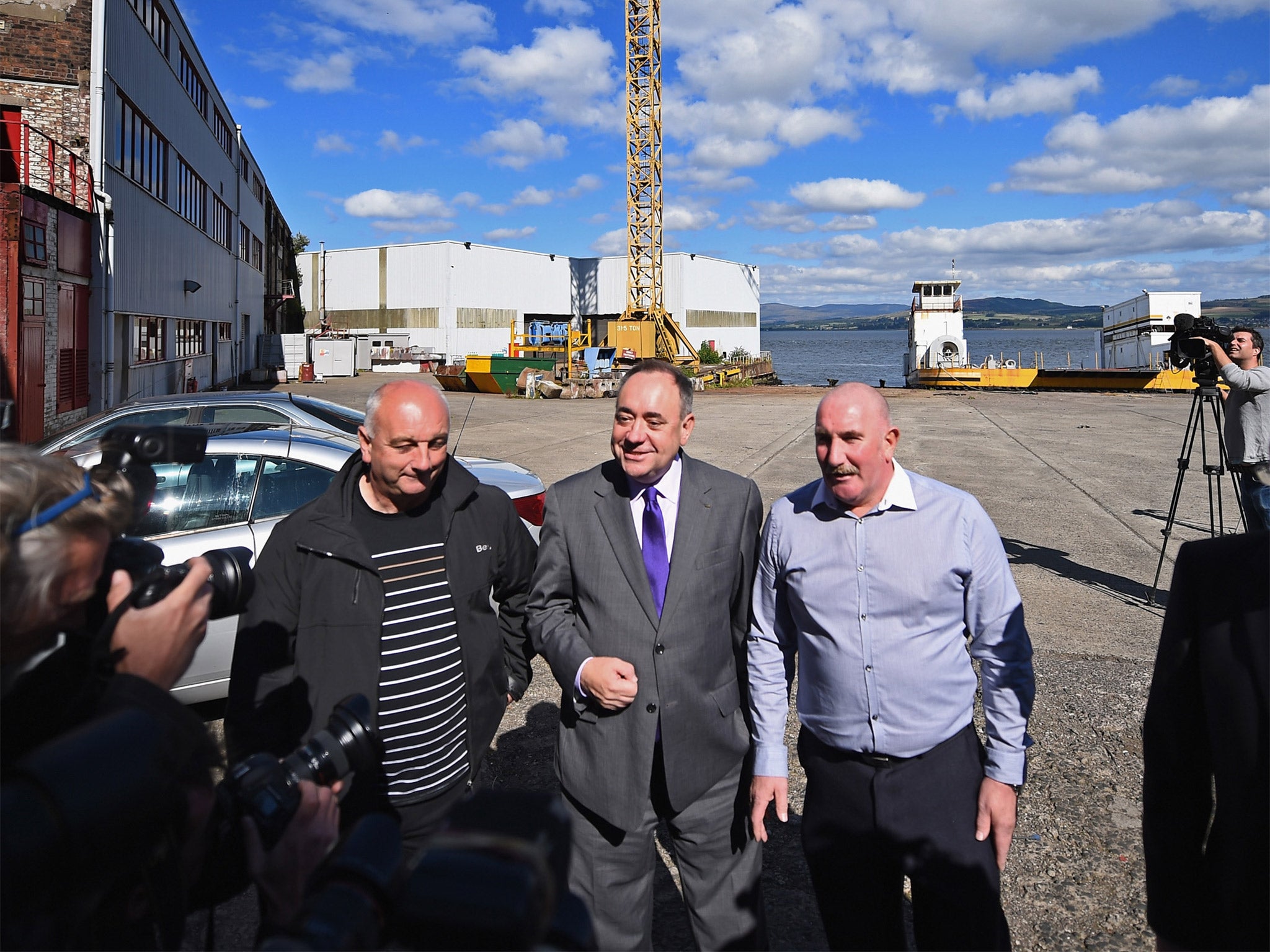Scottish independence: Alex Salmond celebrates fightback but still faces upstream battle towards referendum
First Minister must tackle five issues to ensure Scotland votes Yes

The four words that Alex Salmond used to close his televised debating victory over Alistair Darling – “This is our time” – has left the Yes campaign with a renewed belief that they can still persuade Scotland to leave the union.
Despite firm answers on public service funding and currency still unclear, the First Minister’s team of advisers nevertheless expect some of the fissures exposed in the Glasgow debate can be worked on between now and 18 September to produce a knife-edge poll result that will leave Westminster uneasy till the last ballot is counted.
So after the dramatic fight back, which some nationalists said merited comparisons with the spirit of Robert the Bruce, what issues do Mr Salmond and the Yes campaign now need to focus on if they want to spook Westminster’s confidence that Scotland, regardless of Darling’s bad night, will still say No?
Independence will open Scotland to new opportunities
Scotland as a new state with unlimited opportunities, has, according to the Yes team, yet to be fully pushed. Mr Salmond’s advisers believe that as the vote nears, the reality of Scotland being able to rely on its own decisions will prove decisive. “Control” will be re-enforced in remaining set-piece speeches. Mr Salmond launched attacks on Mr Darling for “defending” Conservative policies on the NHS. The underlying message? In “Scottish hands”, none of this would be happening. Mr Salmond expects this will be a critical to unlocking the support of those undecideds who regarded Westminster as “distant and Tory”.
Independence will boost growth and jobs
Control of Scotland’s finances and governance over the Scottish economy is another theme expected to dominate the run-in rhetoric. Part of the package that criticises Westminster as too focused on itself, the positive jobs and growth message is designed to shout over the inconsistencies and risks that exist in an over-reliance on oil revenue, and a lack of guarantees on the currency issue.
The Yes campaign are confident they’ve shot Mr Darling’s fox over the pound. One adviser said: “People just want to know they’ll be using the pound. They don’t care about the detail behind a currency union, or complex arguments over fiscal control. And as Alistair Darling said, there is nothing to stop Scotland using the pound.”
That may be oversimplistic. What lies behind a currency and its value is the impact on growth rates, investment, debt levels and therefore the jobs markets. Nevertheless, expect the phrase “an escape from the cosh of Westminster” to feature in remaining debates.
Self-belief and confidence
Mr Salmond has tried to show he can run a competent government. Emotional references to Scotland’s “independent” past have been minimal. Although the “Brave Heart” appeal was expected to feature heavily in his referendum campaign, it has been low key as his advisers think now isn’t the time to ramp up the history lessons. Instead, the opening themes mentioned by Mr Salmond in the debate – “this is our time” and “let’s seize it [the moment] with two hands” – were more about confidence and self-belief. That reflects the belief in the Yes camp which claims that Scotland wants to break from the union – but can only do so if it ditches, they believe, the baggage of the union.
Mr Salmond is seen as a master of this part of his leadership brief. One adviser said: “We really don’t need the ‘rise and let’s be a nation again’ stuff.”
Oil
Alistair Darling repeatedly questioned the reliance Scotland has on oil. He claimed the volatility of global oil markets, would leave annual education and health budgets exposed. Alex Salmond attempted to defuse the Darling scare tactics, claiming that any nation would be delighted to have the oil assets of Scotland. It’s expected, over the next three weeks, that rather than hide from Westminster’s claim of over-reliance, the Yes vote will push the benefits of oil, and push their claim that the reserves will last longer than currently forecast.
Expect the comparisons with an oil-rich Norway also to feature prominently. Current forecasts estimate oil would account for 15 per cent of the Scottish economy. In Norway, that figure is 20 per cent plus. “No one ever hears attacks on Norway’s reliance on oil,” said one adviser.
The positive mood of the Yes campaign
Alex Salmond has never taken two and two and just made four. His arguments for an independent Scotland have relied on leaps of faith and optimism. The success of one debate, in a campaign where the Yes vote has never had a lead of any kind, won’t win the referendum.
But if there is now a bounce in the first polls, the First Minister will act as though Scotland is already in the UN. “Last night was critical. It was the shot in arm we needed,” said one adviser. “If people are convinced this [winning] might happen, then we’re nearer than we’ve ever been.
Join our commenting forum
Join thought-provoking conversations, follow other Independent readers and see their replies
Comments